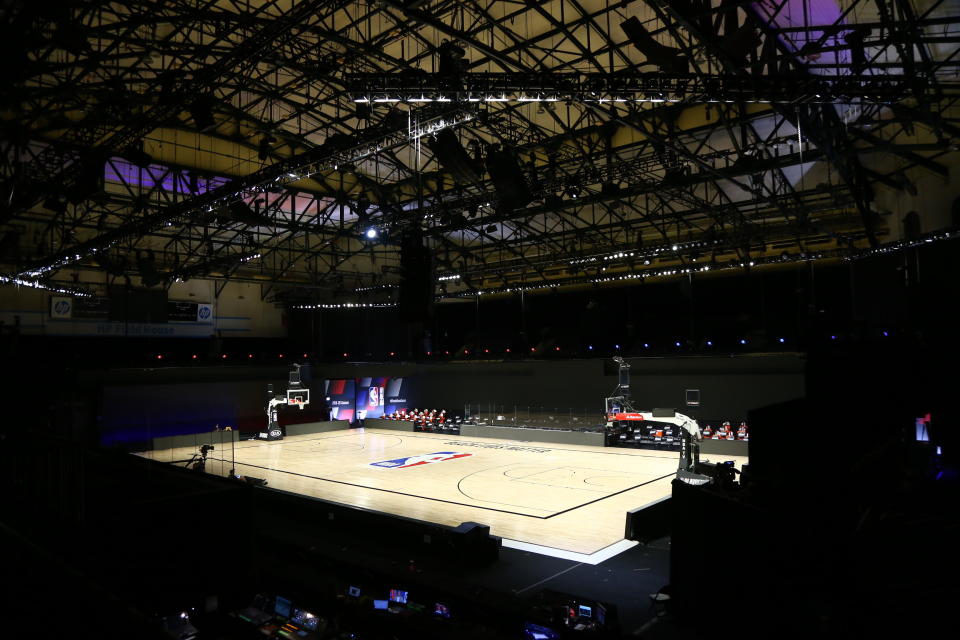The NBA season will resume. Players, though, can still 'move from protest to progress'
Some 53 years before NBA players walked out on their season, 53 years before a police officer shot Jacob Blake, in the fall of 1967, Dr. Harry Edwards founded the Olympic Project for Human Rights. The goal was to fight racial injustice. Edwards ultimately helped engineer a boycott of the 1968 Games. Kareem Abdul-Jabbar, then Lew Alcindor, and other Black athletes refused to participate. Tommie Smith and John Carlos raised their fists on a podium. Edwards stood by them. And he has watched as other athletes have taken similar stands in the half-century since.
“There've been boycotts before,” he says.
But this? A league-wide strike in the name of human rights? During the NBA playoffs?
“That’s unprecedented,” Edwards told Yahoo Sports. Which is why the multi-sport movement that unfolded Wednesday took even him, perhaps the world’s foremost authority on athlete activism, some time to “wrap my mind around.”
“You can demonstrate, and I'm supportive of demonstration,” he said over the phone Wednesday night. “But at the end of the day, I've always advocated for the strongest possible action. And that was a boycott. And this is something that really got everybody's attention. And it's going to spread.”
A boycott, or more accurately a strike, “puts more teeth into the situation than a protest where statements are made,” Edwards explained. “Kaepernick made a statement. Tommie Smith and John Carlos made a statement. The athletes who are boycotting today with the NBA are sending a message: We are serious about this. Stop killing us! It's more important that we deal with that than we play a basketball game and entertain you out here. Stop killing us.”
“That's the message,” he continued. “Now the issue becomes, as I've told some of the athletes and the coaches … how do you create a strategy that gets you to next steps? And that's always the challenge: To move from protest … to progress.”

Formulating a strategic plan
NBA players met for nearly three hours Wednesday night at Disney World’s Coronado Springs resort. The question looming throughout the meeting, sources told Yahoo Sports’ Chris Haynes, was the big one: Should they walk out on the remainder of the season?
The Los Angeles Lakers and Los Angeles Clippers voted to do just that, sources told Haynes. Other teams, though, voted to play. On Thursday morning, the players met again, and decided to resume the playoffs.
To Edwards, however, the question of ending the season was never the right one to ask. “I don't think that's the issue now,” he said. “They are not boycotting basketball any more than Kaepernick was protesting the flag and the anthem.” Rather, players are sending a message about police brutality. A strike wasn’t the endgame. It was a means to real, tangible change.
The players, Edwards said, should be negotiating a strategic plan for enacting that change. “You've got to get people who are in the best position to leverage what they have access to to compel changes,” he said. By that, first and foremost, he means the billionaires who own NBA franchises. “They can pick up the telephone and call a governor, and a governor will pick up,” he explained. “They can call the attorney general, and the attorney general will pick up. They can call the mayor, and the police chief of a local town, and then have one of the athletes go with them to talk about these issues that we have to clean up.
“In other words, these are people that have resources that they can leverage, to get this situation [fixed]. So owners, sponsors,” broadcast partners – anybody who benefits from basketball being played, and who’ll suffer if it isn’t played— must help the players push for change. “But they've got to be strategic about it,” Edwards said.
Protest to progress
The NBA’s board of governors also met Thursday. A prolonged strike would have pulled them to the negotiating table, to engage with players, coaches and league officials, to figure out how they can help push for racial justice. With the players deciding to resume play, their leverage is diminished. But they still have power. They’ll need to use it to get the owners to work together.
“It's for the owners, the sponsors, the players, to all come out with a united front, saying, ‘We're going to go to the governor of Wisconsin, and we're gonna work our way down through the attorney general, to the local DA, to the police commissioner, to the neighborhood organization groups, and so forth,’ ” Edwards said.
Milwaukee Bucks players have already spoken with Wisconsin politicians. They released a statement calling on “the Wisconsin state legislature to reconvene after months of inaction and take up meaningful measures to address issues of police accountability, brutality and criminal justice reform.” Next, they’ll need others to echo their call. LeBron James, according to Haynes’ sources, was critical of NBA owners at Wednesday’s meeting, suggesting they weren’t doing enough to support players and Black people facing systemic racism. Players, owners, union reps and league officials will meet Thursday afternoon “to discuss next steps,” according to the NBA.
The threat of a strike provided owners with incentive to listen to players and do more. But workers don’t strike just to strike. Players don’t protest just to protest. As Edwards likes to say: They protest for progress. And progress can be made even as the playoffs get back up and running.
More from Yahoo Sports:



